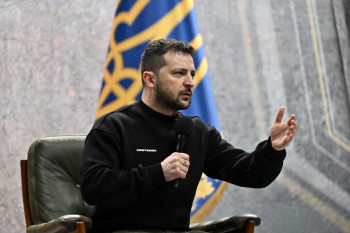In an interview with Germany's Focus Magazine, Prime Minister Denys Shmyhal said that the recent procurement scandal at the Defense Ministry does not point to a larger systemic issue of corruption in Ukraine.
According to Shmyhal, Ukrainian society has changed as a result of the war and has "zero tolerance" for corruption.
He emphasized the swift response when the scandal broke, adding that "the rapid detention of people suspected of abuse indicates a change in Ukraine's approach to these issues."
On Jan. 21, the news outlet ZN.UA released an investigative report claiming that the Defense Ministry was purchasing food for soldiers at prices that were higher than usual.
As per the report, the Defense Ministry reportedly agreed to purchase eggs at a rate of Hr 17 per item, which was significantly higher than the price of eggs in grocery stores in Kyiv, where they were sold for approximately Hr 7 per egg.
Likewise, a kilogram of potatoes to be ordered for Ukrainian soldiers cost Hr 22, while the price in Kyiv grocery stores was about Hr 9, ZN.UA reported.
The National Anti-Corruption Bureau of Ukraine (NABU) stated on Jan. 23 that it had begun investigating possible corruption in the Defense Ministry’s food procurement.
As a result of the scandal that emerged, internal audits conducted in 2022 resulted in fines for 497 officials within Ukraine's Armed Forces and Defense Ministry, with 124 of them facing disciplinary action.
Deputy Defense Minister Vyacheslav Shapovalov was later dismissed. A court arrested Shapovalov for 60 days on Feb. 2. and set bail at Hr 402.6 million ($10.96 million).
Shapovalov was suspected by the State Bureau of Investigation (DBR) of lobbying for contracts for food for the military at inflated prices. According to a report published by Ukrainska Pravda, he was also suspected of purchasing bulletproof vests, helmets, and clothing of poor quality for military needs for over Hr 1 billion ($27.2 million).
On Feb. 9, Defense Minister Oleksii Reznikov stated, "My position was, is, and will remain unchanged — zero tolerance for any violations. Each person whose guilt has been proven by the relevant authorities bears and will bear responsibility."
Reznikov shared details on Feb. 10 about working group meetings within the anti-corruption advisory body under the Defense Ministry, which included members from several noted anti-corruption NGOs.
When the scandal broke, Reznikov said he would resign if President Volodymyr Zelensky asked him to. He was quoted by the Guardian on Feb. 15 that he would ultimately remain in the position at Zelensky's request.
The minister later announced personnel changes and appointed new deputies on Feb. 14.










